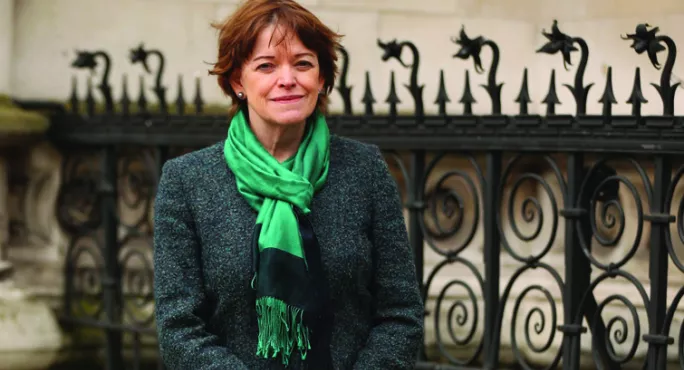- Home
- Glenys Stacey: My time in charge of Ofqual? Non, je ne regrette rien
Glenys Stacey: My time in charge of Ofqual? Non, je ne regrette rien

Dame Glenys Stacey is leaving Ofqual at the end of this month with her head held high.
In her first interview since announcing her departure in August, the outgoing chief executive told TES that she had made no errors since taking charge at the exams watchdog in 2011.
She said that she was proud of having helped to “shape up a good, competent regulator” over the past five years. And asked whether she had made any mistakes in that time, Dame Glenys said that she had not.
“That might sound arrogant, [and] I don’t mean to sound arrogant,” she said. “But I have reflected on it. I anticipated you asking that, and I genuinely don’t.
“I think if five years ago someone had said to me that in five years’ time this is what you will have achieved, I would’ve said, ‘That’s great.’”
Bumps in the road
Dame Glenys’ comments may raise eyebrows among some in education as her spell at Ofqual has not been without controversy. Many headteachers were angered by the way that Ofqual handled the 2012 English GCSE grading affair. There were calls for her resignation at the time, but her stance was backed by a win in the High Court.
However, it hasn’t been plain sailing since then - last year, Ofqual had to tell exam boards to tear up sample maths GCSE test papers it had approved after it emerged that they were pitched at the wrong standard.
Ministers, already angered by Ofqual’s decision to remove science practicals from final exam grades, were said to be “very frustrated” that boards appeared to be submitting sample papers that were “the easiest they think they can get away with”.
But this week Dame Glenys told TES: “It wouldn’t be fair to say that they [exam boards] are shooting to be the lowest standard at all. I don’t see that. It’s a bit odd for a regulator to be empathetic, but they’re doing a very difficult job.”
The chief regulator, whose damehood was announced in the new year, said that she was “proud” of Ofqual’s work in halting years of rising GCSE and A-level results leading to an annual debate over ‘grade inflation’.
“We’ve developed an approach that enables true achievement to be recognised,” she said. “When you think back, it seems impossible now that we were in that past era where the results in this country didn’t square with our results in international tests in any way.”
The process that has ended rising grades, known as “comparable outcomes”, was “the best approach that we know” for awarding grades, she said.
The system effectively pegs GCSE grades nationally to previous years’ performance after taking into account pupils’ prior attainment in key stage 2 test results. Some heads fear it means that genuine national improvements in performance cannot be recognised.
Ofqual is planning to address this concern with a “national reference test” that would show whether pupils in a sample group had performed better than those in previous years, allowing a potential rise in GCSE grades.
But Dame Glenys, who is to become the next chief inspector of probation, played down the importance of the test, which is being trialled this year, saying that the current system
would be sufficient if it failed. “[The national reference test] is not an essential thing - exam boards can award without it,” she said.
Schools are also grappling with what has been described as a “tsunami of reform”, with the introduction of new A-levels and new GCSEs - which will be graded from 9 to 1 instead of A* to G and include tougher new content.
‘Eye-watering’ pace of reform
Dame Glenys acknowledged that the pace of reform was “eye-watering” and could cause difficulties for schools.
“There will be volatility [in grades] school by school; it always happens when you change a qualification,” she said. “Those changes will happen at a time when accountability measures are changing as well, so there’s a lot for schools to cope with.” But she insisted that the reforms, although “pretty pacy”, were not being rushed. “If we thought the pace was untenable, we’d be flagging it,” she said.
That is unlikely to reassure anxious schools - Ofqual has yet to approve two thirds of the new GCSEs and A- and AS-levels that they will have to teach from September.
Dame Glenys’ successor had not been named as TES went to press. Asked what challenges the new chief regulator would face, she said that they said would have to be “right on top of the results” of the new qualifications.
And being on top of the job is clearly something that Dame Glenys is personally proud of: “I did go there to create a competent regulator and I believe I’ve done that.”
This is an article in the 5 February edition of TES. Read more coverage in this week’s TES magazine, available in all good newsagents. To download the digital edition, Android users can click here and iOS users can click here
Want to keep up with the latest education news and opinion? Follow TES on Twitter and like TES on Facebook
Keep reading for just £1 per month
You've reached your limit of free articles this month. Subscribe for £1 per month for three months and get:
- Unlimited access to all Tes magazine content
- Exclusive subscriber-only stories
- Award-winning email newsletters



